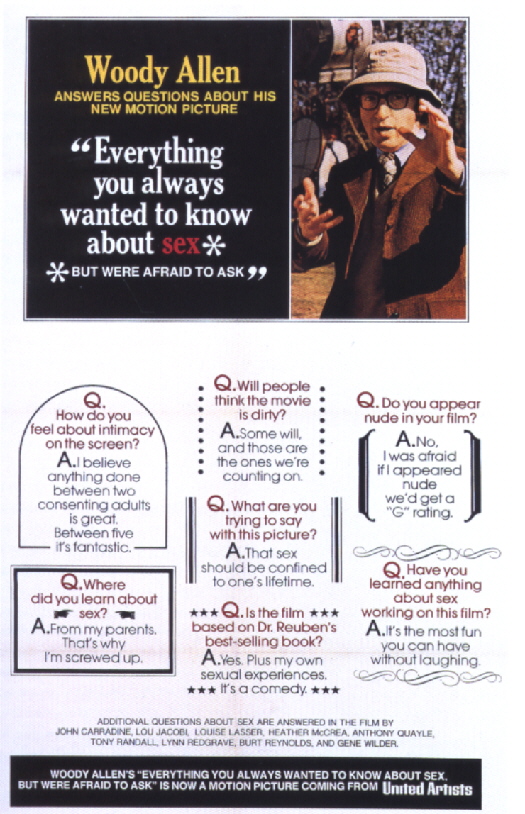- Everything You Always Wanted to Know About Sex* (*But Were Afraid to Ask)
Infobox_Film
name = Everything You Always Wanted to Know About Sex *
(* But Were Afraid to Ask)

caption= Theatrical poster to "Everything You Always Wanted to Know About Sex * (*But Were Afraid to Ask)
director =Woody Allen
producer = Charles Joffe
writer =Woody Allen
David Reuben
starring =Woody Allen Louise Lasser John Carradine Tony Randall Burt Reynolds Gene Wilder
Jack BarryErin Fleming Lynn Redgrave Regis Philbin Heather MacRae
distributor =United Artists
released =August 6 , 1972
runtime = 87 min.
language = English
imdb_id = 0068555
music =
awards =
budget =
Infobox movie certificates
United_States = R [cite web |url=http://www.time.com/time/magazine/article/0,9171,877848,00.html|title=Woody Allen: Rabbit Running|publisher="Time"|date=1972-07-03|accessdate=2007-06-08|quote=According to "Time", the R rating stood for Rabelaisian]"Everything You Always Wanted to Know About Sex* (*But Were Afraid to Ask)" (1972) is
Woody Allen 's fifth film, consisting of a series of short sequences loosely inspired by the book of the same name.The film was an early smash for Allen, grossing over $18 million dollars in the U.S. alone against a $2 million dollar budget.
Film Structure
The credits at the start and close of the film are played over a backdrop of a large mass of apparently copulating rabbits, to the tune of "
Let's Misbehave " byCole Porter .The film is divided into seven vignettes, as follows:
# "Do Aphrodisiacs Work?"
In which a court jester (played by Allen) gives a lovepotion to a Queen (played byLynn Redgrave ), but is foiled by herchastity belt . There are references to Shakespeare's "Hamlet " throughout.
# "What is Sodomy?"
In which a doctor (Gene Wilder ) falls in love with the partner of an Armenian patient ... a sheep.
# "Why Do Some Women Have Trouble Reaching an Orgasm?"
About a woman (played byLouise Lasser ) who can only reach orgasm in public. Allen's homage to Italian film-making in general and "Casanova 70 ",Michelangelo Antonioni andFederico Fellini in particular.
# "Are Transvestites Homosexuals?"
In which a middle-aged married man (played byLou Jacobi ) experiments with women's clothes.
# "What Are Sex Perverts?"
Which features a parody of thegame show "What's My Line? " called "What's My Perversion?", filmed inkinescope -style and hosted by Jack Barry. The four panelists who attempt to guess the contestant's perversion areRegis Philbin ,Robert Q. Lewis ,Pamela Mason , andToni Holt . After they fail to guess that the contestant's perversion is "Likes to expose himself on a subway", a second segment of the show is presented, in which a selected viewer (in this case a rabbi) gets to act out his bondage and humiliation fantasy.
# "Are the Findings of Doctors and Clinics Who Do Sexual Research and Experiments Accurate?"
In which a researcher (played by Allen) and journalist Helen (Heather MacRae ), visit a researcher (played byJohn Carradine ) who formerly worked withMasters and Johnson but now has his own laboratory complete with a lab assistant named Igor (played byRef Sanchez ). After they see a series of bizarre sexual experiments underway at the lab and realize the researcher is insane, they escape before Helen becomes the subject of another of his experiments. The segment culminates with a scene in which the countryside is terrorized by a giant runaway breast created by the researcher.
# "What Happens During Ejaculation?"
Which is set in a man's brain (and other parts of the body) as he gets involved in a sexual clinch. We see theNASA -like control center in the man's brain (headed byTony Randall and featuringBurt Reynolds as theswitchboard operator) and see the soldier-like sperm (one of them portrayed by Allen) as they are dispatchedparatrooper -style into the great unknown.Critical response
An August 1972 review by "Time" said that many of the film's ideas "sound good on paper" but that the "skits wind down rather than take off from the ideas"; the film includes "some broad, funny send-ups of other movies ("
Fantastic Voyage ", "La notte "), and its fair share of memorably wacky lines" but that "overall it is just Woody marking time and being merely a little funnier" [cite web |url=http://www.time.com/time/magazine/article/0,9171,878031,00.html|title=Flailings and Failings|publisher="Time"|date=1972-08-21|accessdate=2007-06-08]The "
Time Out Film Guide" noted that some of the film's sketches are "dross, but the parodies of Antonioni (all angst and alienation of a wife who can achieve orgasm only in public places) and of TV panel games ('What's My Perversion?') are brilliantly accurate and very funny. Best of all is the sci-fi parody entitled 'What Happens During Ejaculation?'." [ [http://www.timeout.com/film/64073.html Everything You Always Wanted to Know About Sex, But Were Afraid to Ask movie review - Film - Time Out London ] ]In 2004,
Christopher Null , founder of filmcritic.com, called it a "minor classic and Woody Allen's most absurd film ever." [ [http://www.filmcritic.com/misc/emporium.nsf/reviews/Everything-You-Always-Wanted-to-Know-About-Sex-*-But-Were-Afraid-to-Ask Film review] byChristopher Null , founder of filmcritic.com]Cut sequence
A segment that was filmed but eventually cut out of the film was 'What Makes a Man a Homosexual?'. The sequence had Woody Allen as a common spider and Louise Lasser playing a black widow. After a mating dance on the black widow's web, the spiders make love and the black widow eats the common spider. Allen cut the sequence as he was unable to find a suitable ending for it. [ [http://www.imdb.com/title/tt0068555/trivia Everything You Always Wanted to Know About Sex * But Were Afraid to Ask (1972) - Trivia ] ] Some still photographs of this sequence can be seen on some versions of the film's DVD cover.
References
Wikimedia Foundation. 2010.
